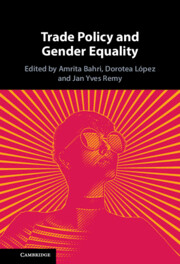Women play strategic roles in societal advancements and economic growth. They are essential partners in any country’s journey towards increased economic, social, environmental and cultural sustainability. Trade can be key to strengthening women’s role as economic actors, and therefore their engagement in trade is crucial. This engagement can be promoted by trade policy, though policy measures in other fields are necessary to make equal opportunities in trade a reality.
Women are not on the same footing as men in many areas, including when it comes to accessing the opportunities created by trade. Gender inequality is a long, widespread and stubborn form of inequality. It will now take more than 130 years to close the gender gap globally, and in 2022, a woman still had only three-quarters of the rights of a man. Evidence shows that women constitute 38 per cent of the global formal workforce, and they are paid, on average, only 77 per cent of what men earn worldwide. Recent studies show that the gender wage gap persists in export-oriented industries, even if women earn more compared to domestic-oriented industries. Additionally, only one out of five exporting companies is women-led. The uneven distribution of unpaid care work between men and women is inhibiting many women from achieving their full potential as economic agents, including in trade. Too many women are still working and trading in the informal sector, making them vulnerable to the economic, social and physical risks attached to it. There are too few women in leadership positions, especially in trade. In the WTO only 36 per cent of ambassadors are women and about 30 per cent of ministers in charge of WTO affairs are women.
This reality, however, can be changed and made anew. Trade can open a door to women’s employment, offering decent work and economic independence. Trade can make the difference by lifting women out of poverty, provided they get a voice and that accompanying policies are in place.
In addition to the traditional barriers women face in trade, growing political instability, health crises and climate change are disproportionately and negatively impacting women’s livelihoods and prospects.
That is why we need this book. It looks at trade and gender from a holistic perspective, approaching the issue from historical and negotiation angles. It also focuses on innovative and forward-looking trade initiatives and policies adopted regionally and nationally. Lastly, it puts a rare emphasis on the most vulnerable women in the world, those living in Least-Developed Countries. This volume is not about proving the links between trade policy and gender equality. They were clearly established a decade ago. In fact, this book is more than a book. It is a trade policy tool providing ideas to decision makers on how to make sure that trade truly delivers for all.

